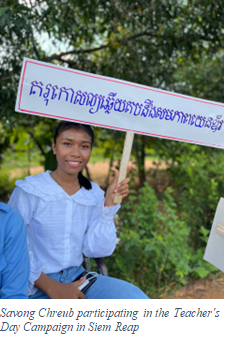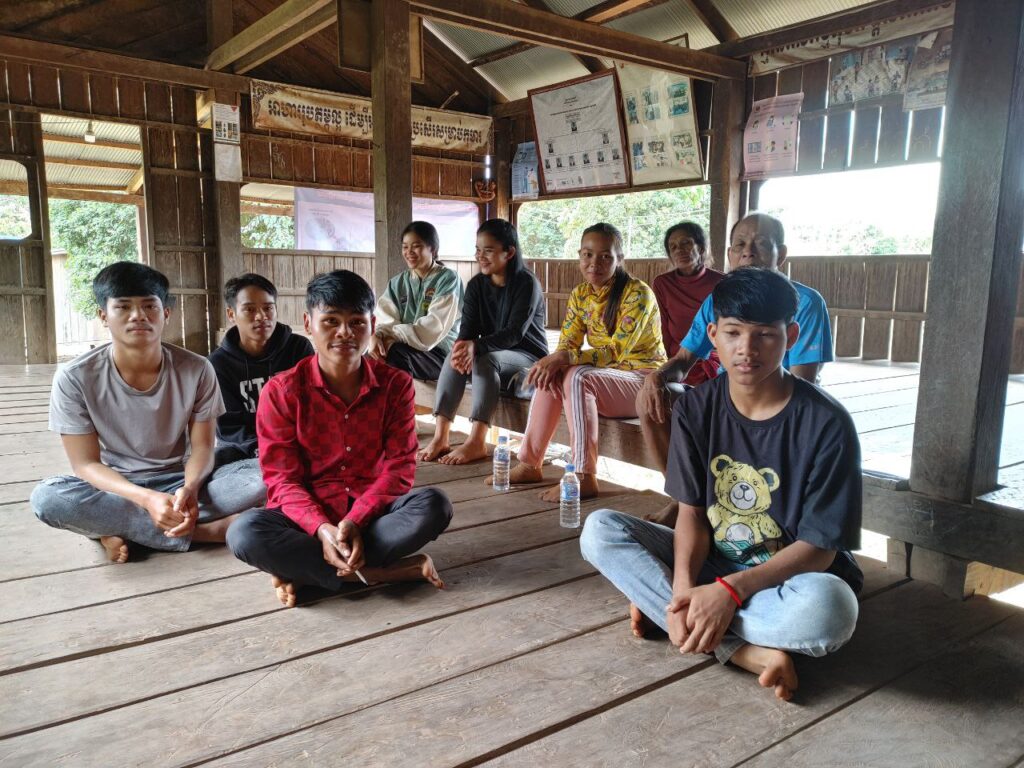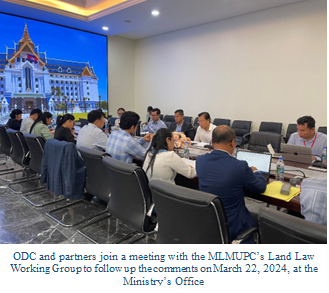Coming from a lower-middle income family residing in a small village in northwest part of Cambodia, Siem Reap, 25-year old Savong Chreub is now a sophomore attending a university in her hometown. She is one of the two members in the family who is pursuing higher education. Having the opportunity for higher education is not common among low-income families who struggle to make ends meet, where girls will be mostly to be pulled out from school to help the family earn a living.

Chreub is a bright and enthusiastic young woman. Not only is she dedicated to her studies, but she also volunteers passionately for the NGO. As the second child in her family to pursue higher education, Chreub is determined to break the barriers that hold back many in her community. Despite being one of five siblings, she is determined to pave her own path and achieve her dreams.
Her journey towards becoming an Education Champion, youth-led social media advocator, began at a Siem Reap Education Support Team (SEST) quarterly meeting where the discussion centered on education issues, particularly focusing on teaching methods. It was there that Chreub’s eyes were opened to the concept of gender responsiveness in teaching. She couldn’t help but reflect on the shortcomings she had observed in the education system. Gender responsiveness was lacking in the teaching methods and there clearly were inequalities within the classroom. “When I was in high school, a teacher mocked me for not performing well in the classroom. I acknowledge that I may not be the smartest learner. However, instead of making fun of me in front of the class, she should have given more support and attention to me in her lessons,” she expressed. She emphasized that “teachers should try to understand the needs and support students without judgement regardless of gender, background, race, or capability.” Additionally, she observed her classmates have been called mean names based on their sexual orientations or class performance.
Chreub joined the NGO Education Partnership (NEP) as an Education Champion, leveraging social media to advocate for gender responsiveness in teaching and learning. Despite facing initial difficulties due to her limited knowledge beyond personal experience, she dedicated hours to learning from education policies, strategic plans, research papers, and reports. She knew that to effectively advocate for change, she needed to have a strong understanding of the issues at hand.
For three months straight, Chreub actively created content on social media, raising awareness about the importance of gender-responsive teaching. Her passion and commitment led her to actively participate in discussions with SEST members during quarterly meetings and other educational events.
Chreub acknowledged that the issue might not be fully addressed yet, but her efforts haven’t gone unnoticed. Teachers and friends began to pay attention. They engaged with her social media campaign, seeking to learn more about gender-responsive teaching. Additionally, Chreub finds joy in echoing the concerns surrounding this issue. She believes it has a profound impact on students, constraining their ability to unlock their full potential.
As part of its main objectives of building up education stakeholders’ capacity in advocacy efforts, the youth engagement activity that Chreub has enthusiastically led has incorporated more perspectives of gender related issues in education and how youth could start taking part in tackling challenges that affect them. NEP’s implementation of “Promoting access to quality and inclusive education for all through public advocacy campaigns” encourages youth like Chreub to advocate for change in education, promoting equality and quality education for all. Chreub’s journey exemplifies the power of a single voice in initiating conversations and driving positive change in the area of education.
Similar Stories
Pride Champions
KUY SovannChai, 17, is a student at General Education and Technical High School in Siem Reap province. Sovannchai became a member of Pride Corner’s core team after he participated in SOGIESC training conducted by Love in Diversity (LID) on August 30-31, 2023. Being a part of the core team, he frequently shares his knowledge to acquaintances about LGBTQI+ and SOGIESC in order for them to gain better understanding. Sovannchai believes that this is valuable information worth learning and spreading. He expressed satisfaction that CSS, through KYA, established a Pride Corner at his school. He believes that the Pride Corner serves as an exceptional place for fostering information dissemination and discussion related to LGBTQI+ issues. In addition, Sovannchai applied the knowledge he gained during the training session to participate in an essay competition focused on respect for LGBTQI+ rights and eliminating discrimination. As a result of his efforts, his essay was one of the top ten essays received. The competition was organized by KYA leading up to the Angkor Youth Camp. In contrast to Sovannchai, HEUN Chanmakara, 22, wasn’t always in agreement with the concept of LGBTQI+. His perception changed following his experience of volunteering with the organizing team for the 9th AYC. Prior to the camp, Makara openly expressed his disapproval of LGBTQI+ individuals during his guest appearance in KYA’s “I Know We Know” podcast. He perceived individuals identified as LGBTQI+ as abnormal and admitted to discriminating against them by avoiding any interaction with them. Taking part in AYC changed Makara’s mindset when it comes to LGBTQI+ and SOGIESC. Makara expressed that he understands these concepts better than ever before. “If a friend confides in me about their identity as an LGBTQI+ individual in future, they can rest assured that they have a supportive ally who will never discriminate against them”, said Makara. Similar to Makara, PREM Neth, 19, wasn’t always very familiar with the topic of LGBTQI+ or SOGIESC. After joining the same training that Sovannchai did with KYA and LID, Neth’s view was expanded. Neth shared that it was her first training about the topic and she, along with other students, gained lots of insights from the training, especially various struggles and challenges faced by LGBTQI+ people. Neth said: “I used to call names to my gay friends making fun of them. I didn’t think that the name calling was hurtful and affected their feelings. It was a mistake that I regret.” “I have since apologized to them and stopped calling them names. I also encouraged other friends to follow my footsteps as well,” Neth added. Neth’s story serves as a great example of how a bit of open-mindedness goes a long way. Not only did she change her own mindset, but she is determined to help changing others,’ including those of her own family. Neth expressed that her participation in KYA’s activities met with a lot of questions at first from her parents, but after taking time to explain to them, her parents approved of her involvement with KYA’s activities. PREM Neth is one of KYA’s core members who often participated in KYA’s activities, including sharing sessions
Indigenous youth become confident in expressing himself
Participating in discussions and learning about current issues boosts indigenous youth’s confidence. “Because I participated in various activities and training, I now feel more confident in expressing myself and my community.” Mr. Mong Samut is a 22-year-old Brao indigenous youth. He was born in a remote area located in Sieng Say village, Ta Veaeng Kraom commune, Ta Veaeng district, Ratanakiri province. This is where he is living with his family. As an indigenous youth, he had few opportunities for further education. He was a young farmer without a confident expression and so preoccupied with his job that he was unaware of the situation outside of the community. However, land and forestry issues have arisen in his community. He wishes to seek assistance and share these conflicts and challenges with others to obtain protective intervention. Mr. Mong Samut (Red shirt) participated in the meeting on identifying topics on NRM and land conducted by CIPL in his village center located in Seang Say village, Taveng Kroam commune, Taveng district, Ratanakiri province. Until he gets to know Open Development Cambodia (ODC) and Conserve Indigenous Peoples Languages (CIPL) organizations, he has a chance to learn and participate in various activities and training such as mobile report training, data visualization and storytelling, and identifying topics on natural resource, land, and environment. He has learned how to identify problems, edit videos, and gain basic knowledge of natural resources, land, and forestry. Even though his knowledge cannot be compared to that of people living in cities, he is dedicated and always pays more attention to the lesson and discussions. The desire to express the community\'s issues and challenges keeps him go on. He is ready to share what is going on in his community while gathering information from others to share with his own. He pledges to open his community\'s culture, livelihood, and issues through what he learned if given the opportunity.
The more the merrier: Incorporating inputs into the draft land law
The ODC\'s Civil Society Support Activity: Cluster Anchor Grant initiative demonstrates the value of collaborative advocacy and strategic participation in achieving legislative reforms that benefit society. ODC\'s path, which focuses on promoting meaningful engagement in natural resource management and building social inclusion, shows devotion, determination, and effective action. Our effort ensures that the voices of communities, Community-Based Organizations (CBOs), and Civil Society Organizations (CSOs) are not only heard but also integrated into the drafting process of the Land Law, which governs land rights and management in Cambodia. In January 2024, ODC began the process by formally requesting the draft Land Law from the Ministry of Land Management, Urban Planning, and Construction (MLMUPC), paving the way for collaborative involvement. When ODC received the draft Land Law in February 2024, its team immediately began mobilizing efforts. ODC organized coordinated events and dialogues to promote extensive consultations and discussions, involving stakeholders at both the sub-national and national levels. Working with legal experts, ODC ensured that the complexity of the legislation was clarified, allowing for involvement and informed input from the grassroots to the national level. ODC\'s collaborative efforts paid off, as we had inputs that reflected diverse viewpoints. With 60 pages of the matrix comments, ODC submitted its inputs to the Ministry within a tight timeframe (February 16), demonstrating its commitment to constructive participation and lobbying. Beyond the submission, ODC realized the value of ongoing communication and advocacy. Addressing gender equality in land ownership and encouraging continuous talks among CSOs, ODC highlighted concerns and options for future engagement with the Ministry. ODC\'s proactive approach resulted in a follow-up meeting request, indicating its commitment to ensure that ODC\'s inputs are not just recognized but also included in the legislative process. “Thank you! I appreciate the inputs and comments from the CSOs on the Draft Land Law. If the government asks the consultant to do it, it might take a million dollars to do so”, H.E. THENG Chan-Sangvar, Secretary of State and MLMUPC’s Land Law Working Group. The impact of ODC\'s combined efforts was clear when the Ministry acknowledged and integrated more than 15 points from ODC\'s submission, indicating a significant step toward inclusive policymaking. While ODC\'s efforts are not always directly acknowledged, the realization of their combined impact emphasizes the significance of ongoing lobbying and collaborative participation. Contributing to the new draft Land Law, ODC remain committed to working for communities\' rights and interests. Armed with knowledge, unity, and a common vision for a more fair and equitable society, ODC are prepared to face the challenges ahead, confident in its power to affect significant change through collective action.


